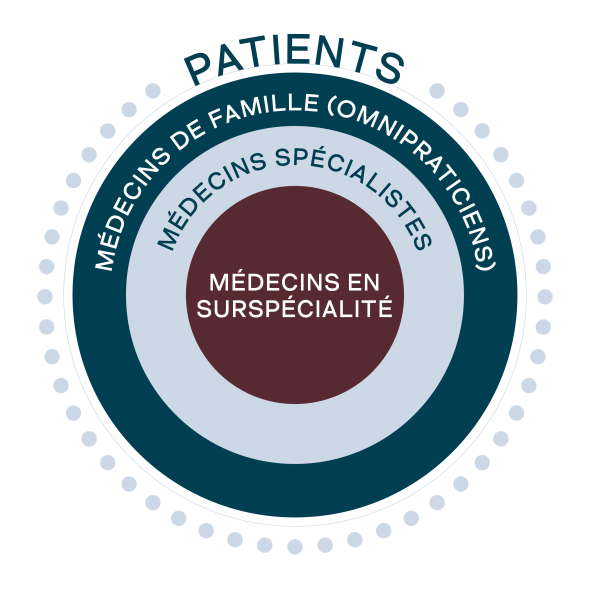Get access to a medical specialist
The CRDS: a single point of entry for a first consultation with a medical specialist
Created to facilitate access to specialized medical care, the Centre de répartition des demandes de services (CRDS) is the single point of entry for family physicians in offices, CLSCs or Family medicine groups to refer patients who need an initial consultation with a medical specialist in one of the 26 participating specialties (in French only).

- Equitable access for all
- A personalized and simplified approach
- Schedule automated appointments by the CRDS, rather than by the patient.
- An appointment according to the urgency of the patient's medical condition
- A consultation with a medical specialist near the patient's place of residence

Before getting a first consultation with a medical specialist, you must first consult a primary care physician. Your family doctor or the general practitioner that you will have consulted in your office, CLSC or Family medicine groups will assess your health condition and decide whether to refer you to a specialist.
Don't have a family doctor?
Refer to a resource that offers walk-in medical consultation (such as a group of family doctors or a super clinic). Register with the Guichet d’accès à un médecin de famille (GAMF).
If a consultation with a medical specialist is indeed required, the primary care physician may request an initial consultation with the CRDS.
No action is required on your part to obtain an appointment. Your doctor will fill out the required form to be treated by the CRDS. If necessary, he or she may indicate the name of a specialist, office or institution. The form will indicate the clinical priority that should be given to your case. The referral forms have been developed by a team of medical specialists and family physicians.
If the family physician refers you to a specialist who is not on the list of specialties covered by the CRDS, you will have to make your own appointment. The family doctor will give you a prescription for this. He or she or clinic staff will give you contact information for hospitals or clinics where you can make an appointment.
Once your request has been received, the CRDS staff in your region will analyze it according to three criteria:
- The clinical priority assigned on the standardized form
- The respect of the nominative reference
- The need to provide services as close to the patient's home as possible
Medical specialists are an integral part of the CRDS teams and review consultation requests in order to determine which to prioritize.
The CRDS will then contact you to set up an appointment location, date and time.
Once an appointment with a medical specialist has been scheduled, it is important that you attend at the agreed date and time or cancel as soon as possible if you are unable to make it. This time slot will then be available for another patient.
During your consultation, the medical specialist will evaluate your medical condition and determine the necessary follow-ups.
After your appointment, the medical specialist will communicate the results to your referring physician.
If the medical specialist deems it necessary to see you again for a follow-up after the first consultation, you will simply have to follow the instructions that will be given to you.
" Some 55,000 consultations are carried out each month through the CRDS for all 26 participating specialties, throughout Quebec. "
To date, the CRDS has offered Quebecers more than one million appointment slots with medical specialists.
Are you looking for a medical specialist?
If you know the name of the medical specialist, search the directory of the Collège des médecins du Québec. You can also visit the website of the medical association concerned; some associations provide a directory of their members.
Need advice related to a health issue?
The FMSQ cannot answer medical questions or interfere in patients' medical records. To learn more about medical specialties, visit the Our Specialists page